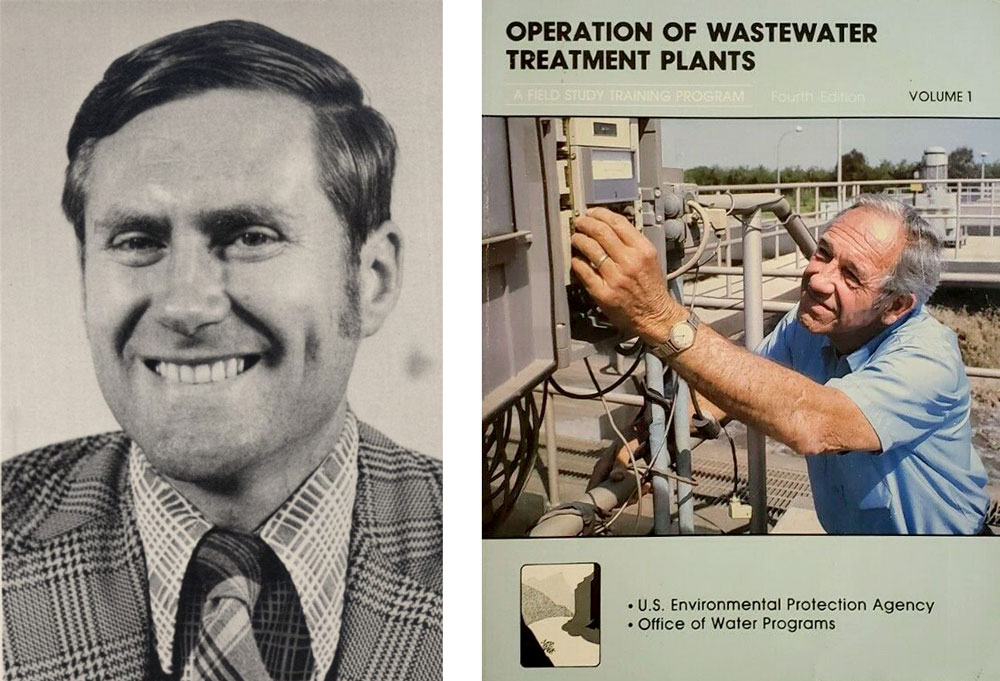
Dr. Ken Kerri (l) and one of the famous Office of Water “Sac State” textbooks.
![]() It’s no coincidence that the Clean Water Act (CWA) and the Office of Water Programs (OWP) are both celebrating 50th anniversaries in 2022. The CWA set the stage for the development of OWP’s robust training and research programs that serve many disciplines and communities in the water sector.
It’s no coincidence that the Clean Water Act (CWA) and the Office of Water Programs (OWP) are both celebrating 50th anniversaries in 2022. The CWA set the stage for the development of OWP’s robust training and research programs that serve many disciplines and communities in the water sector.
OWP continues to expand and adapt to serve the water sector in new ways, building on the seeds of success that were planted with the CWA and people passionate about improving public health and protecting the environment.
Those people included wastewater treatment plant operators Bob Reed, Walt Driggs, John Brady, and Norm Farnham, who in the late 1960s, hounded, pestered, cajoled, and pleaded until OWP founder Dr. Ken Kerri agreed to create a manual to “teach us to do our jobs.”
Dr. Kerri agreed on the condition that the operators would do the work and write everything down, so that he “would only have to shuffle papers.” It’s clear that Dr. Kerri didn’t hold himself, much less the operators, to that condition.
Weekly discussions started with a topic, such as lift stations, manholes, collection systems, or a treatment process, and the question, “What would you tell a new operator that knew nothing about this topic?” Early meeting notes were written in longhand. Later meetings began with oral presentations that were recorded, transcribed, typed, and circulated.
Vendors were invited to share operation and maintenance techniques, photos, drawings, and troubleshooting tactics for their equipment. The first editions of most of the training manuals were made up of the information gathered at these meetings.
The organization that came out of these discussions and funding from the US Environmental Protection Agency (EPA) in 1972 now draws on many more people passionate about the water sector, improving people’s lives, and protecting the environment.
OWP editorial and graphics staff continue to work with subject matter experts to update and improve the library of manuals and courses to make the information as accessible and affordable as possible while offering the best information on the ever-evolving technology in the water sector. A recent major redesign incorporates effective learning techniques, utilizes color to connect similar learning elements and improve navigation, and presents high-resolution graphics and photos.
OWP also offers online math courses to give operators more instruction and practice in this challenging aspect of an operator’s job. New online courses to supplement the printed training material and offer learners another way to access that material are in development.
Ten specialty staff, 6 support staff, and 5 student assistants continue the work of updating, improving, and delivering 20 training manuals and over 50 associated courses that operators or operators-in-training can take for continuing education units, contact hours, and college credit.
In 1997, Caltrans turned to OWP for stormwater quality expertise. OWP staff, led by Dr. Ramzi Mahmood—who became OWP director the same year—assisted in planning experiments and interpreting data from Caltrans’ extensive monitoring program for runoff quality and treatment best management practices (BMPs). They also advised on incorporating scientific results into Caltrans’ statewide stormwater program.
Over time, OWP has added staff to provide research services to a variety of mainly governmental partners addressing needs in water quality, data analysis, cost assessment, watershed planning, modeling, and water policy issues.
Recently, the organization added technical assistance to disadvantaged communities (DACs) to the portfolio of work. As the designated Environmental Finance Center (EFC) for EPA Region 9, OWP provides resources, training, and technical assistance to build capacity and expertise in communities facing environmental challenges, particularly those related to managing local utilities.
Dr. Mahmood and 20 staff scientists and researchers, 5 support staff, numerous undergraduate and graduate student assistants, and multiple faculty collaborators from Sacramento State and other universities offer an expanding range of services to meet agency needs.
From its beginnings as a bare-bones training manual producer, OWP has grown into an internationally recognized provider of training materials in a variety of media as well as a source of engineering and scientific research that fills the niche between academia and consulting.
OWP’s commitment to the objectives in the Clean Water Act fuels its growth into a sustainable organization that contributes educational and technical solutions to water sector challenges.